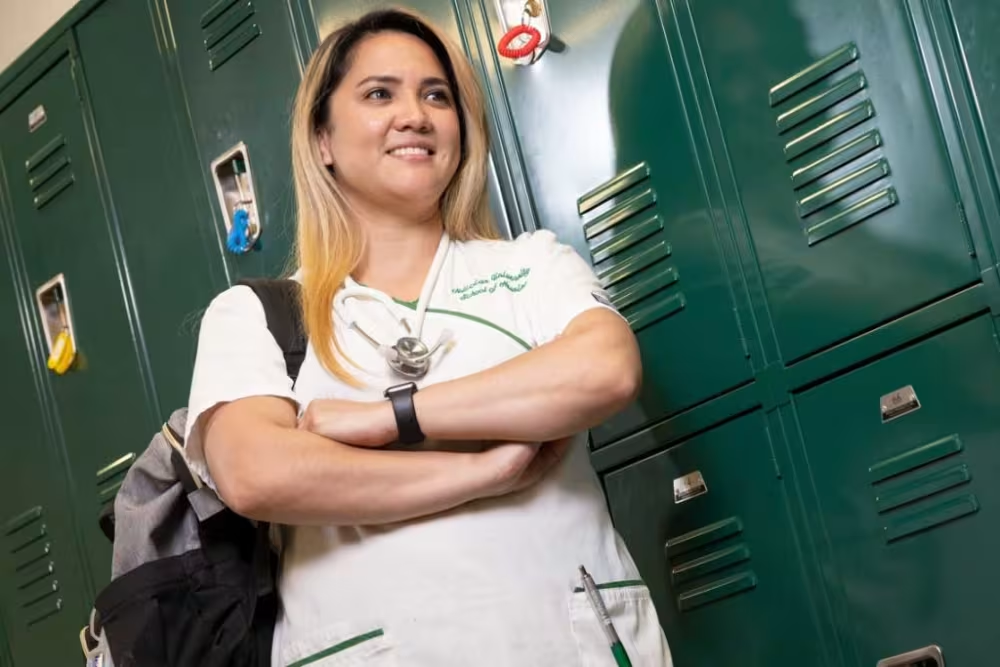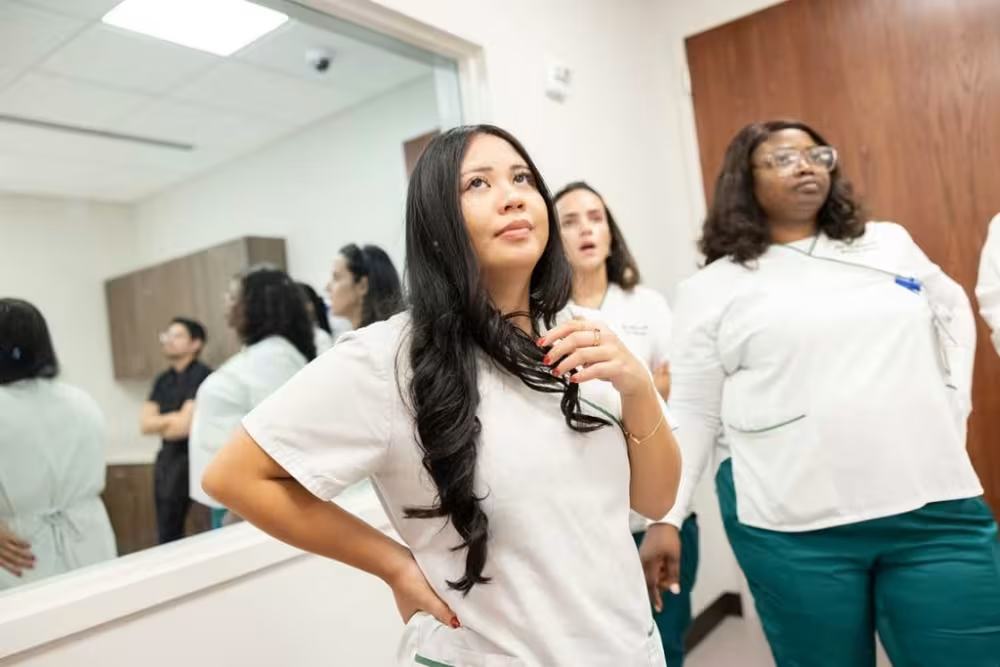What Are the Prerequisites for Nursing School?
Each blog post is dated and contains accurate information as of that date. Certain information may have changed since the blog post publication date. If you would like to confirm the current accuracy of blog information, please visit our ABSN overview page or contact admissions at (844) 347-2497.
Nursing school prerequisites ensure students entering an accelerated nursing program have a strong foundational knowledge. While the exact nursing school prerequisites depend on where you apply, you’ll find most of them focus on the sciences. These courses teach you the biology and chemistry principles that you’ll need in nursing school.

Completing prerequisite courses is a common admissions requirement before starting an academic program. Students generally don’t need prerequisites before starting a traditional four-year nursing program; however, they are often a requirement to enter an accelerated nursing program.
What are the prerequisites for nursing school? They are a series of courses intended to provide foundational knowledge prior to starting an academic program. In Felician University’s Accelerated Bachelor of Science in Nursing (ABSN) program, applicants must meet the seven ABSN prerequisite and nine general education requirements to be eligible.
The number and type of prerequisites you must take depend on the program and your educational background.

Is nursing school hard? Learn what to expect in the accelerated nursing program.
Science Courses
At Felician University, you will need a solid science foundation to enroll in the Hybrid ABSN or On-Ground ABSN. The required science nursing prerequisites include:
Microbiology
In microbiology, you’ll learn about bacteria, viruses, fungi, and parasites. These organisms play a major role in human health and are the root cause of infectious diseases; therefore, understanding microbiology will help you grasp infection treatment and prevention.
Anatomy and Physiology I and II
Nurses must understand the structures of the human body and how they work. Anatomy will teach you to identify the body's various bones, muscles, arteries, nerves, and organs. Physiology will teach you about the body’s systems, such as the cardiovascular, respiratory, and renal systems.
Pathophysiology
While physiology is the study of how the healthy human body works, pathophysiology looks at how diseases function. You’ll learn how conditions like heart disease and stroke develop and affect the body.
Principles of Chemistry
Studying chemical reactions is instrumental in preparation for nursing school. In part, this is because nurses are responsible for administering medications to patients. Knowing the fundamentals of chemistry helps you understand the science behind those treatments and how they work.

Math Classes
Do you need strong math skills as a nurse? Although nurses do not need an understanding of advanced or complex mathematics, like calculus, they do need to calculate medication dosages and understand measurements, along with other fundamental math skills.
You can expect to take the following math class as a prerequisite for nursing at Felician University:
Statistics
Knowing how to interpret statistics is key before starting nursing school because it teaches you how to interpret data and evaluate research.
Nursing research advances continuously as new research is added to the field’s body of knowledge. With a basic understanding of statistics, you’ll be equipped to interpret data in scientific studies and apply it to support your evidence-based clinical decisions.
Social Science Classes
The social sciences consist of fields and disciplines involving the study of human society and human relationships. Many academic fields within social science exist, such as economics, sociology, and psychology.
In nursing school, psychology is the discipline most relevant to clinical practice, along with human development.
Curious how to prepare for nursing school? Here are eight ways you can get ready.

Lifespan Development
Nurses care for patients across their lifespans. In your Lifespan Development nursing prerequisite class, you’ll come to understand how the human body and mind change throughout life. Learning this development process will help you effectively care for infants, children, adults, and seniors.
General Education Classes
If you have a completed non-nursing bachelor’s degree or an associate degree, you might not need to complete any general education prerequisites. Your admission counselor will determine this during a review of your transcripts. If you do need to complete general education classes, they may include the following:
- Communication and Expression
- Critical and Analytical Thinking
- Ethics, Values, and Truth
- Faith and Reason
- Global Consciousness
- Information Literacy
- Liberal Arts
- Quantitative and Scientific Reasoning
- Technological Acumen

Frequently Asked Questions About Nursing Prerequisites
You may have additional questions aside from “What are the prerequisites for nursing school?” Your best source of information is your dedicated admissions counselor at Felician University. They will review your unique situation to determine which prerequisites you need, put together a plan for you to complete them, and answer any other questions you may have.
Why Are Prerequisites Important?
The value of nursing prerequisites cannot be overstated. These courses prepare you for nursing school success in the following ways:
- They prepare you for the rigor of the nursing curriculum. Nursing school prerequisites can be challenging. Completing them prepares you mentally for what’s to come in nursing school, especially if it’s been a while since you were last in school. Passing all the prerequisites proves you have what it takes to succeed in nursing school courses.
- They ensure you have the right foundation for nursing school. Nursing schools want all students to enter the program with a common knowledge base. That’s where nursing prerequisites come in. These courses put you on a level playing field with the others in your cohort.
- They provide a science background. Most prerequisites for nursing focus on the sciences. That’s because nursing education stems from the life sciences, and having prior knowledge in the field is beneficial. Before you can understand hypertension treatment, it’s key to understand cardiac physiology, which you’ll learn in anatomy and physiology.

Do I Need to Take All of the Prerequisites?
It depends on your prior academic background, which may fulfill some or perhaps even all the prerequisites. If you were a biology major, it’s likely you won’t need to take as many prerequisite courses as students who majored in history, for example.
To fulfill prerequisite requirements, your prior college credits must have been completed within 10 years of your intended ABSN start date.
It’s possible that you might not need the general education prerequisites for Felician University if you have a completed non-nursing bachelor’s degree. Your admission counselor will determine exactly which prerequisites you need to complete.
When Do I Need to Complete the Prerequisites?
All prerequisite courses must be completed within 10 years of your intended ABSN start date. If your prior non-nursing education is expected to fulfill some of the prerequisites, it’s ideal to start the rest of the prerequisites as soon as possible, especially if you’re close to the 10-year deadline.

Apply at Felician University Today!
Felician University offers two flexible nursing program options in New Jersey: the Hybrid ABSN in Parsippany, New Jersey, and the On-Ground ABSN in Rutherford, New Jersey. Regardless of your chosen program delivery option, you can complete the program in as few as 16 months.
These programs incorporate nursing coursework, hands-on labs, and clinical rotations. In the Hybrid program, you can complete coursework online while still gaining essential hands-on experience through nursing labs and clinical rotations. If you prefer in-person instruction, you can complete coursework in a classroom in the On-Ground ABSN.
We offer three start dates each year for the Hybrid ABSN and one for the On-Ground ABSN. You may be eligible to apply to our ABSN programs if you have a non-nursing bachelor’s degree or at least 60 non-nursing college credits.

Wondering whether to choose online or traditional nursing coursework? Use our guide to help you decide the right path for you.
Contact our admission counselors today to learn more about the ABSN program, our nursing school prerequisites and how you can take the first steps toward enrollment.
